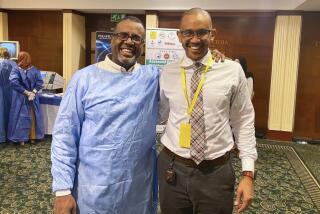He’s Too Busy Building a School in Sudan : Brother Joe’s Staying Despite Rebellion
- Share via
WAU, Sudan — Brother Joe is staying. He’s too busy planning a new science building for his school to be frightened off by rebels here in southern Sudan.
Father Joseph Shubitowski, 51, a Jesuit priest from Detroit, stands out in Wau, a city virtually surrounded by anti-government rebels. He is tall and muscular and has fair skin, white hair and twinkling blue eyes. He has lived in Sudan for six years, the last three in Wau.
Locals call him Brother Joe.
He started building his secondary school shortly before the Sudanese People’s Liberation Army took up arms against the Muslim-dominated government in the capital, Khartoum, three years ago. The rebels want economic and administrative reforms and autonomy in their southern region, which is populated mostly by Christians and animists.
Agencies Pull Out
German, Canadian and Italian relief agencies have pulled out of Bahr el-Ghazal province, where Wau is situated, because of rebel encroachment. The rebels control several major towns in the province.
Brother Joe says it’s too early to leave.
“There were lots of missionaries here,” he said in an interview. “They pulled out except for us and the Indian Carmelite sisters. I think it is premature at this point to move out. This is a war between the Sudanese and themselves. It does not affect me as a foreigner. Should it become dangerous for me as a foreigner, then I might reconsider.”
He and five other American Jesuits run the school. But because of the summer recess, only he and Father Richard Cherry, 49, of Toledo, Ohio, are in Wau. The others are home on vacation.
Life Isn’t Easy
Even with a generator and regular supplies from Khartoum and abroad, life is far from easy. The city has had no electricity or running water for more than a year because of rebel activities.
“We have a generator, and we have not yet run out of gasoline,” Shubitowski said. “Our diet is rice, pasta and Dinka beef bought from the local market.”
The Dinkas, the largest single ethnic group in Sudan, populate most of Bahr el-Ghazal and make up most of the rebel army.
The Jesuits named their institution Loyola School after St. Ignatius Loyola, founder of their Roman Catholic order, the Society of Jesus. The hill on which the school sits was once known as Gabal Kheir (Mountain of Goodness) and is known now as Gabal Loyola.
6 Classrooms Finished
Shubitowski said the decision to build at Wau was made before the rebellion began in 1983. In three years of construction, six classrooms have been finished.
The classrooms and the living quarters of the Jesuits stand neatly in one corner of the mountaintop, while the rest of the fenced-in area is a messy construction site.
Getting construction and other supplies, including British textbooks from London, has been a nightmare, Shubitowski said.
“There have been no trains from Khartoum for two years,” he said. “The only way to get supplies is through Nairobi (in neighboring Kenya).
“Now with the rebel conflict, it looks like all the roads to Wau will be closed. If not, the rainy season will pretty much close any roads the rebels leave open.”
Most of his pupils are teen-agers but some are as old as 40, he said.
“I have just finished the library,” he said. “We have 6,000 volumes, which were donated.”
No Completion Date
He said he had hoped to have the science building well under way by now, “but the situation is a bit tight, and I don’t know when it will all be finished.”
The Jesuits planned a school for 250 students, but that goal remains far off. Shubitowski said school began last year with 87 pupils and ended with 57.
Some left because they could no longer afford to stay in school and had to go back to their home towns, while others were pressured to go into the bush and join the rebels.
Shubitowski said the Detroit province of the Missionary Order of Loyola started its work in Sudan after Jesuit missionaries in India were ordered by the Indian government to stop their work there.
When the Vatican sent them to Sudan, he said, his first post was in Busari, a village near Wau, where three other American Jesuits remain. He helped in a seminary there for three years.
Refugees Swell Population “Then, just as I was about ready to leave, the bishop asked if we would be interested in starting a school here in Wau,” he said.
Wau’s population has grown from 40,000 to 100,000 because of the influx of refugees from drought and insurrection. Bishop Joseph Nyekindi runs a Roman Catholic coeducational primary school in the city, while the government operates three secondary schools.
“I have gone through a mixture of feelings down here,” Shubitowski said. “It is so isolated, but it’s a very positive thing. Once the construction is finished, it will be my choice in consultation with my superiors whether to stay here or go.
“I don’t know yet. And I also don’t know how long it will take to finish the school.”
More to Read
Sign up for Essential California
The most important California stories and recommendations in your inbox every morning.
You may occasionally receive promotional content from the Los Angeles Times.













